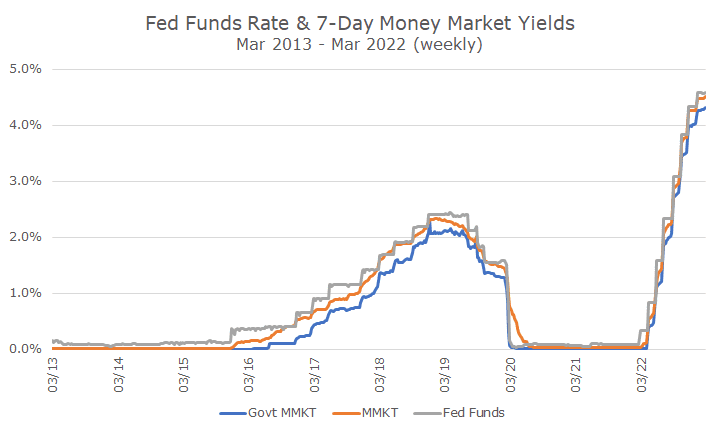After the market closed on Friday afternoon, I was sitting at my desk at the office, wondering what I was going to write about this week. I’m sort of tired of the banking crisis for the moment, even though it’s not over: Deutsche Bank was in the hot seat Friday.
In any case, a terrific longtime client (and reader!) called to ask some questions about money market funds, and it occurred to me that there hasn’t been much to say about cash for most of the last decade.
Client Question 1: The money market you bought yields 4.31 percent, and there is another one that yields 4.51 percent (as of 3/24/23). Why didn’t you buy that one?
My reply: Good question! The fund that we bought only invests in government securities. The higher-yielding one buys a bunch of things, and some of them have credit risk. Although the top holding is government related, two of the other four are big US banks, and two are foreign governments.
There are all probably okay, but for an extra two-tenths of a percent in yield, it’s nice not to worry about the credit risk.
The fund with the credit risk is also less liquid. According to the fund fact sheets, the government fund holdings are 99.6 percent liquid in a single day. The non-government fund holdings are 42.2 percent liquid in a day and 55.2 percent in a week.
If client withdrawals start pouring in, they might have to start selling securities that aren’t as liquid and be forced to accept low prices. Again, for the extra yield, it hardly seems worth it to us.
Client Question 2: How long are those yields good for?
My reply: Not very long. Yields on money market funds are quoted on a 7-day basis. Why’s that? Because the holdings mature almost as quickly. The weighted average maturity of the government fund is eight days and 17 days for the other fund.
The yield on a money market is highly sensitive to the Federal Reserve rates, as the chart below shows (there were no charts on our Friday call), sadly). The Fed rate is in gray, the government fund is in blue and the other money market is in orange.

Client Question 3: When I look at the trailing one-year return, they are more like one and a half percent. That seems low compared to the yield.
My reply: Indeed. A year ago, the Fed rate was a lot lower – about zero actually, as the chart above shows. The return wasn’t zero because the money market funds could buy new securities every week or so as interest rates rose.
Client Question 4: The government fund only has 34 holdings, and the other one has 427 holdings. Shouldn’t we want the extra diversification (okay, we didn’t talk about this, but it’s a good question!).
My imagined reply: Normally, the number of positions is a good measure of diversification, but with government securities that mature in 10 days, you’re not worried about the creditworthiness or the duration. That’s why they call this a ‘risk-free’ rate. The fund with the credit exposure has to buy more securities to spread around the credit risk.
Client Question 5: Does this slow things down if I need to withdraw money?
My real answer: Yes, by one day. These money market funds are ‘position-traded,’ which means that we have to buy and sell them. They aren’t cash, they are money market mutual funds. They have a one-day settlement, so it doesn’t slow things down much, but it’s a good idea to give us a heads-up.
Last Question: Are the money market funds FDIC-insured? (Okay, he didn’t ask this either, but I wanted to put in a sentence about how they aren’t FDIC-insured).
Nope, money market funds are not FDIC insured, but we buy the government fund, as noted above, so everything that the fund holds is backed by the full faith and credit of the US government.
That’s the end of the real and imagined Q&A, but we did take about how cash was so uninteresting for so long because yields were zero. Just one year after starting to earn a little something on cash, bank deposits are in the news because of the bank failures.
To me, that’s a little bit of a Goldilocks problem: the bank failures are too hot, and the zero yields are too cold. I’m ready for a ‘just right’ period for cash.

